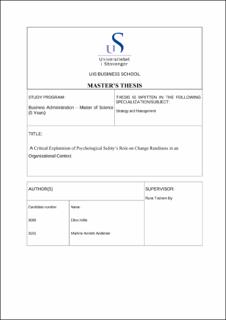| dc.contributor.advisor | By, Rune Todnem | |
| dc.contributor.author | Hille, Eline | |
| dc.contributor.author | Andersen, Martine Anneth | |
| dc.date.accessioned | 2020-09-21T13:15:55Z | |
| dc.date.available | 2020-09-21T13:15:55Z | |
| dc.date.issued | 2020-06-15 | |
| dc.identifier.uri | https://hdl.handle.net/11250/2678844 | |
| dc.description | Master's thesis in Strategy and Management | en_US |
| dc.description.abstract | The purpose of this dissertation was to investigate the role of psychological safety on creating and sustaining organizational change readiness. The literature review provided indications that psychological safety has a positive effect on creating change readiness. Psychological safety is recognized as an important strategy for creating change readiness in a group because psychological safe environments increase the team members’ propensity to engage in learning behaviors which positively affects their ability to recognize and implement change initiatives. Further, it was suggested that psychological safety served as a positive catalyst on addressing the five key change beliefs which must be addressed in the change message for change recipients to support the change initiative.
To investigate the role of psychological safety on change readiness in an organizational context, a survey measuring the two constructs was distributed to all employees in Company X. The respondents were measured to have a high level of psychological safety and change readiness. The findings from the data analysis provided implications that a positive relationship between psychological safety and change readiness existed, and that the group of respondents with high scores on each construct were associated. There were found no statistically significant differences among respondents with the highest levels of psychological safety and change readiness related to their group memberships. This finding could indicate that the presence of a high level of psychological safety decreases the psychological barriers in the organization that potentially could have reduced the levels of change readiness. Due to the positively skewed distribution of respondents’ scores, the absence of psychological safety on organizational change readiness were not possible to investigate.
Based on the literature review and data analysis, it was recommended that Company X re-address the key change beliefs and builds psychological safety to increase the employees’ levels of change readiness. Scholars are recommended to further investigate the effect size of psychological safety on organizational change readiness, and adjust the ROCR questionnaire. | en_US |
| dc.language.iso | eng | en_US |
| dc.publisher | University of Stavanger, Norway | en_US |
| dc.relation.ispartofseries | Masteroppgave/UIS-HH/2020; | |
| dc.rights | Navngivelse 4.0 Internasjonal | * |
| dc.rights.uri | http://creativecommons.org/licenses/by/4.0/deed.no | * |
| dc.subject | økonomi | en_US |
| dc.subject | administrasjon | en_US |
| dc.subject | strategi og ledelse | en_US |
| dc.subject | psychological safety | en_US |
| dc.subject | change readiness | en_US |
| dc.title | A Critical Exploration of Psychological Safety's Role on Change Readiness in an Organizational Context. | en_US |
| dc.type | Master thesis | en_US |
| dc.subject.nsi | VDP::Social science: 200::Economics: 210::Business: 213 | en_US |

